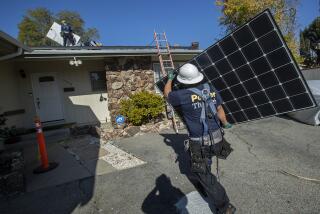Owners of energy-efficient homes less likely to default on loans
- Share via
WASHINGTON — If you buy or own an energy-efficient house, does this make you less likely to default on your mortgage? Is there a connection between the monthly savings on utility costs and the probability that you’ll pay your loan on time?
A new study by the University of North Carolina suggests that the answer to both questions is a resounding yes.
Using a sample of 71,000 home loans from across the country that were originated between 2002 and 2012, researchers found that mortgages on homes with Energy Star certifications were on average 32% less likely to default compared with loans on homes with no energy-efficiency improvements. Energy Star homes, which can be renovated dwellings or newly built, provide documentable savings of 15% or higher on utility bills compared with houses containing minimal energy improvements.
Researchers took pains to statistically separate out factors other than energy-efficiency savings that might account for the strikingly different performances by borrowers on their mortgages. They controlled for house size; age of the house; neighborhood income levels; house values relative to the area median; local unemployment rates; borrowers’ credit scores; loan-to-value ratios; electricity costs; and even local weather conditions.
The sample came from a giant mortgage data repository managed by CoreLogic, a California company that has access to millions of loan files and payment records supplied by major banks, lenders and servicers. The average sale price of both the energy-efficient homes and the others was about $220,000, removing the possibility that the energy-efficient properties were high-end houses purchased by families who are less likely to default.
So why the big difference in payment performance among borrowers during the roller-coaster decade that saw the mortgage bubble, the housing price boom, the calamitous bust and the start of a recovery? To Cliff Majersik, executive director of the Institute for Market Transformation, a Washington, D.C., think tank that sponsored the research, there’s no question.
“It stands to reason,” he said, “that energy-efficient homes should have a lower default rate because the owners of these homes save money on their utility bills, and they can put that money toward their mortgage payments.”
In light of the superior performance of mortgages on certified energy-saving houses, what discounts or preferences can borrowers or owners of such houses expect at the bank when they go in for a loan? After all, a key component of the interest rate you pay on a mortgage is compensation for default risk — that is, the possibility that you’ll go belly up, walk away, end up in foreclosure and produce big losses for the lender or bond investor.
For example, if you have a low FICO credit score of 620, you present a high risk of nonpayment to the lender and are virtually guaranteed to be charged a higher rate. On the other hand, if you have a platinum 800-plus FICO score, you’re likely to be quoted the best rates and generous underwriting terms — all because your statistical risk to the lender is lower.
But here’s the problem with the way the mortgage system treats energy efficiency: Under current practices, you’d be hard-pressed to find any lenders who will give you a better rate quote on your mortgage application, even if you showed them documentation that your house saves buckets of money on utility bills.
The authors and sponsors of the study think lenders should start factoring energy efficiency into their underwriting. They’ve also begun meeting with officials from the mortgage industry, Congress and government to suggest how to do it: If not a lower interest rate, they argue, then at least give loan applicants who can demonstrate significant energy bill savings a break on upfront fees, debt-to-income ratios or maybe some wiggle room on minimum down payments.
Bob Sahadi, a mortgage industry veteran who now works for the Institute for Market Transformation, said lenders “have wanted hard evidence” that energy savings reduce defaults.
Now they’ve got it.
Steve Baden, executive director of RESNET, a national nonprofit group that helps homeowners with energy-efficiency improvements, takes the issue one step further. He argues that if mortgage lenders — confronted with statistical proof that borrowers who buy houses that save on energy outlays are at lower risk of default — decline to start recognizing this fact with more favorable pricing, they “are indeed overcharging consumers.”
Sounds right.
Distributed by Washington Post Writers Group.
More to Read
Inside the business of entertainment
The Wide Shot brings you news, analysis and insights on everything from streaming wars to production — and what it all means for the future.
You may occasionally receive promotional content from the Los Angeles Times.










